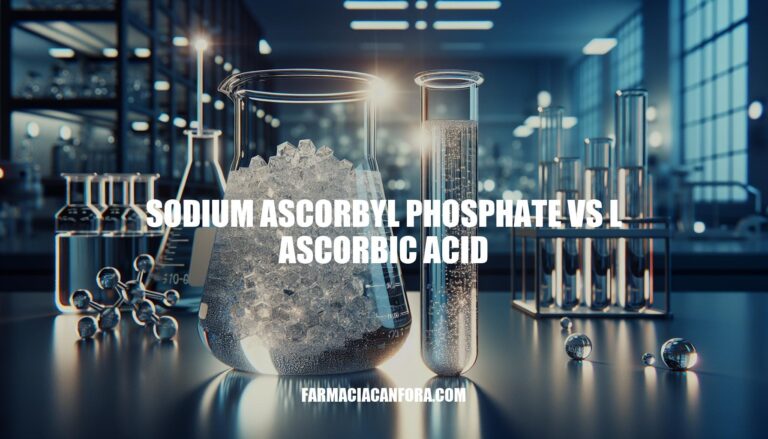


In skincare, understanding the differences between sodium ascorbyl phosphate and L-ascorbic acid is crucial. Both are forms of vitamin C, but they vary in stability, potency, and skin compatibility. Knowing these differences can help you choose the right product for your skin type and achieve optimal results.
L-Ascorbic Acid (Vitamin C) has the chemical formula C₆H₈O₆. It is a simple molecule with a six-carbon ring structure and multiple hydroxyl groups, making it highly reactive and prone to oxidation when exposed to light, air, or heat.
Sodium Ascorbyl Phosphate (SAP) is a derivative of ascorbic acid. It is formed by combining ascorbic acid with a phosphate group and sodium, resulting in the chemical formula C₆H₆Na₃O₉P. This modification significantly enhances its stability, preventing it from oxidizing as quickly as L-ascorbic acid.
The increased stability of SAP makes it a preferred choice for skincare formulations, as it remains effective for a longer period and is less likely to degrade, ensuring consistent antioxidant benefits and skin brightening effects.
L-Ascorbic Acid (LAA) is the most potent form of Vitamin C, known for its superior effectiveness in penetrating the skin and delivering maximum results. It excels in stimulating collagen production, brightening the skin, and reducing signs of aging. However, it is highly unstable and can easily degrade when exposed to light and air. Additionally, LAA can be irritating, especially for those with sensitive skin.
Sodium Ascorbyl Phosphate (SAP), on the other hand, is a stable, water-soluble derivative of Vitamin C. While it is less potent than LAA, it is much gentler on the skin, making it an excellent choice for individuals with sensitive skin or those prone to irritation. SAP also offers anti-aging benefits, helps brighten the skin, and has antimicrobial properties that can aid in acne treatment.
In summary, L-Ascorbic Acid is more potent but can be irritating, whereas Sodium Ascorbyl Phosphate is less irritating and more suitable for sensitive skin.
Here’s a concise comparison:
Sodium Ascorbyl Phosphate (SAP):
L-Ascorbic Acid:
Formulation: SAP is a water-soluble derivative of Vitamin C, created by combining ascorbic acid with salt and phosphate. It is stable and less prone to oxidation compared to L-ascorbic acid.
Usage: SAP is gentle and suitable for sensitive skin. It offers antioxidant protection, brightens skin, stimulates collagen production, and has acne-fighting properties.
Best Practices:
Formulation: L-ascorbic acid is the purest and most potent form of Vitamin C. It is highly effective but unstable, requiring careful formulation with low pH and stabilizing agents like ferulic acid and Vitamin E.
Usage: L-ascorbic acid provides strong antioxidant protection, brightens skin, and boosts collagen production. However, it can be irritating for sensitive skin.
Best Practices:
Incorporating either form of Vitamin C into your skincare routine can enhance your skin’s health and appearance.
Sodium Ascorbyl Phosphate (SAP) and L-Ascorbic Acid are two forms of Vitamin C with distinct differences in stability, potency, and skin compatibility.
SAP is more stable and less irritating, making it suitable for sensitive skin, while L-Ascorbic Acid is highly potent but can be irritating. For anti-aging benefits, brightening, and protection, both forms can be effective, but SAP is a better choice for sensitive skin due to its gentleness.
For optimal results, use products with 1-5% SAP or 10-20% L-Ascorbic Acid, and follow best practices for application, concentration, and storage. Ultimately, the best form of Vitamin C depends on individual skin types and concerns: SAP is recommended for sensitive skin, while L-Ascorbic Acid is suitable for non-sensitive skin with careful formulation and usage.